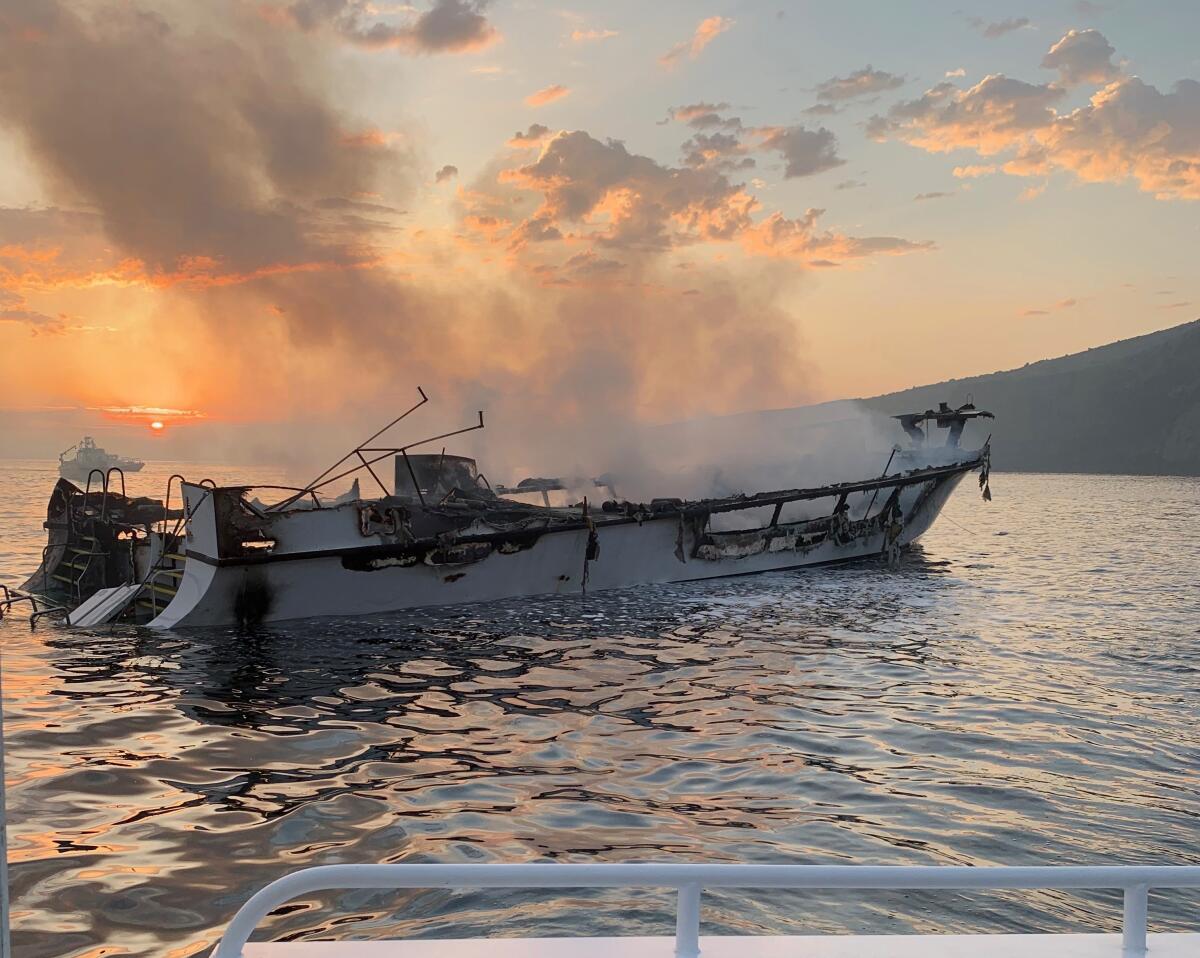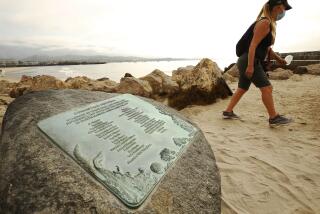A ‘pop,’ a ‘crackle,’ then ‘fire!’: NTSB records show dramatic moments as flames swept Conception dive boat

Late on the eve of Labor Day 2019, as the crew of the Conception buttoned up the 75-foot dive boat, galley hand Ryan Sims plugged in his cellphone and saw sparks fly from the socket, just before he headed to bed.
He later told investigators that “while still in a sleep-like state, he had heard a pop and then a crackle downstairs,” followed by a crew member yelling, “Fire! Fire!” according to National Transportation Safety Board records released Wednesday.
Sims and four other crew members who’d been jolted awake tried to make their way down from the wheelhouse atop the three-deck boat, but it was too late.
By then flames had engulfed the Conception’s main deck, blocked stairways and trapped 33 divers and one crew member in the bunk room in the belly of the wood-hulled boat, killing all of them in one of California’s worst maritime disasters.
The only survivors were the five crew members who managed to jump into the water near Santa Cruz Island. They included Capt. Jerry Boylan, who apparently quickly realized the gravity of the situation.
“The second galley hand recalled that when the captain came to the surface of the water, he said, ‘Oh my God, all those people,’” the records state.
Autopsies later determined that all died of smoke inhalation.
The NTSB records, which include factual reports, transcripts of witness interviews and statements by the crew, provide the fullest account yet of the Sept. 2, 2019, accident off the Ventura County coast, but they do not pinpoint a cause of the fire.
“No physical evidence was recovered that could be identified as an ignition source or indicate a specific ignition location within that area,” the NTSB said. “Therefore, the cause of the fire is undetermined.”
The most intense area of the blaze appeared to be in the salon, on the main level of the boat, where “numerous electronic devices” were being charged, the records noted. Lithium-ion batteries commonly used for computers, cameras and other devices had caused other maritime and aviation fires, it said. The reports noted that crew members told investigators wet equipment was often placed next to the charging stations.
“It is therefore reasonable to include lithium-ion battery failure as a possible ignition source in this fire scenario,” the report stated. “Another potential source of ignition is the vessel’s electrical system in the salon compartment.”
The NTSB reports also identified “potential fire safety issues,” including flammable interior materials, size and accessibility of emergency exits, and the fact that both exits from the bunk room led to the same compartment — which was engulfed in fire.
The NTSB also has questioned the U.S. Coast Guard’s regulation of small boats, including not requiring smoke detectors.
The newly released records underscored the findings of an earlier preliminary investigation by the NTSB that determined all five crew members were asleep on the top deck when the blaze broke out about 3 a.m., despite a requirement that the boat have a roving night watch.
Glen Fritzler, the owner of Truth Aquatics Inc., which operated the Conception, has denied wrongdoing and insisted that the crew was awake when the fire was detected. His attorney has said that a crew member was in the salon less than half an hour before the fire was discovered.
Crew members offered harrowing accounts in handwritten statements to the Coast Guard the day it happened. Some said they tried in vain to reach the doomed passengers.
“I opened both doors and smoke filled the wheelhouse,” Boylan wrote, noting that he made one mayday call before he was forced to leap into the water.
“Flames were coming up to the side doors,” he said and recalled his view of the Conception from the water as he tried to climb back aboard. “I could see the entire inside of the galley, flames coming out all windows.”
Galley hand Michael Kohls said he was asleep when he heard what sounded like a chair moving across the deck and then, about five minutes later, a scream.
“I came out of my room and tried to enter the galley which was completely engulfed in flames,” he said. “I called out ‘FIRE’ to everyone on board. I had to jump over the side railings to reach the galley because the flames had surrounded the wheelhouse.... We could not reach any of the passengers who were cut off to us on the other side of the galley.”
Kohls said he and others then tried to break a window on the bow of the boat, “but the smoke and heat were too intense.” He had no choice but to swim away, he said, “since the entire boat was in flames.”
In his statement, Sims said he was awakened when someone yelled, “Fire,” but was unable to get to the wheelhouse.
“Heard ‘get off the boat,’ ” he wrote. “Jumped out of a window. Hit deck and broke leg.”
Sims made it into the water and then joined other crew members on a skiff that headed to another boat for help. He recalled hearing “a pop” earlier from the main deck of the Conception — and something else.
“Remembered plugging in cell phone at night and seeing sparks,” he wrote.
Sims and other crew members said they were not trained to handle such an emergency.
Built in 1981, the Conception was one of three dive boats operated out of Santa Barbara Harbor by Fritzler. Its design was similar to other dive vessels: stacked bunks in sleeping quarters below deck, a main deck that includes a covered galley toward the bow with an open-air dive area at the stern, and the wheelhouse with the captain’s controls at the top.
The NTSB interviewed captains and crew members from other Truth Aquatics vessels, and all stated that the practices on their vessels were the same as those on the Conception. No roving watches were set while in port or at anchor, according to the report.
Last October, when the Coast Guard examined the Vision, a nearly identical vessel, it found 19 electrical deficiencies. The NTSB report noted on the Vision “cable runs were not enclosed in protective conduit, were often not supported, and did not have the appearance of a professional installation.”
Interviews revealed that electrical work was sometimes done by Vision crew members, who were not licensed electricians.
“Although examination of the Conception’s electrical system was not possible, the examination of the Vision and the similarity of the two vessels would suggest similar electrical installations and condition,” the NTSB reported.
Fritzler previously told The Times he suspects that lithium-ion batteries were a source of the fire. He said he was never warned about the potential dangers by the Coast Guard.
Fritzler’s lawyer, Hilary Potashner, has not replied to a request for comment on the NTSB documents.
The disaster remains under investigation by the NTSB. It also is under criminal investigation by the Coast Guard and the FBI under the supervision of the U.S. attorney. The Bureau of Alcohol, Tobacco, Firearms and Explosives told The Times this month it was completing its report on the cause of the fire.
After the disaster, Coast Guard criminal investigators and the FBI served a search warrant on Truth Aquatics as part of what a Coast Guard spokesman called a “potential seaman’s manslaughter” investigation that carries up to 10 years in prison.
In July, Boylan met with federal prosecutors supervising the investigation in Los Angeles. They presented the captain with evidence from the investigation — a move usually done when “there is sufficient evidence to bring criminal charges,” according to a recent civil filing by attorneys for the owners of Truth Aquatics.
Jeff Goodman, an attorney for nine of the families who lost loved ones in the fire, called it a “preventable tragedy” and said he would review the voluminous NTSB records.
“We will hold those responsible for this disaster fully responsible,” he said. “It is premature to reach conclusions. We are going to be analyzing it in the days ahead with legal and technical experts.”
Goodman’s firm has filed a lawsuit in U.S. District Court in Los Angeles, alleging that the boat’s owners and crew were negligent in their training and operation of the vessel.
The NTSB has said it will hold a public hearing Oct. 20 to announce its findings and recommendations.
More to Read
Sign up for Essential California
The most important California stories and recommendations in your inbox every morning.
You may occasionally receive promotional content from the Los Angeles Times.












